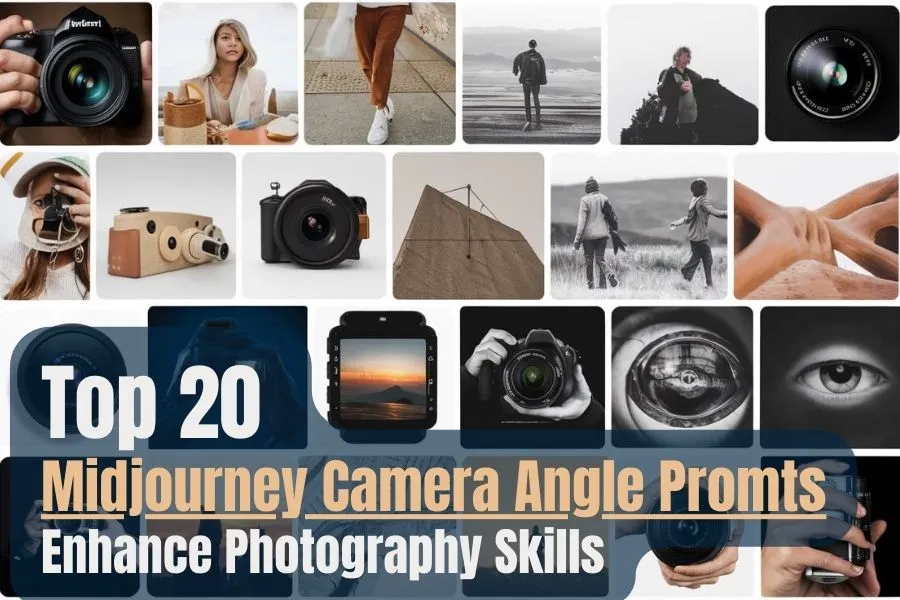Table of Contents
Introduction to Midjourney Camera Angle Promts
Photography is more than just capturing a moment; it’s about storytelling, framing perspectives, and creating moods. Midjourney, a popular tool among photographers and filmmakers alike, introduces dynamic camera angle prompts that can help transform your approach to capturing scenes. These angles not only change the way your audience sees a photo but also evoke emotions, intrigue, and sometimes even suspense. Whether you’re a novice or a seasoned pro, mastering these Midjourney Camera Angle Promts can significantly elevate your skills.
Camera Angles and Their Impact
Each camera angle has a unique way of altering a viewer’s perception, adding layers of depth, meaning, and even mystery to a photograph. By experimenting with various prompts and perspectives, photographers can bring scenes to life, turning the ordinary into something extraordinary.
Top 20 Midjourney Camera Angle Promts for Photographers
Let’s dive into some effective Midjourney Camera Angle Promts that will open new avenues for creativity and help you add flair to your portfolio.
1. The Bird’s Eye View
The bird’s eye view captures a scene from high above, creating a detached, almost omniscient perspective. This angle is perfect for landscapes, cityscapes, or any setting where you want to capture the vastness or organized chaos of a scene. Try this angle next time you’re at a scenic overlook or even just above a table setting for an artistic take on everyday moments.
Example: Aerial shot of a bustling city square.

2. The Worm’s Eye Perspective
For a dramatic effect, the worm’s eye perspective places the camera low to the ground, making everything look towering and grand. This angle is ideal for capturing towering buildings, tall trees, or even people in a way that emphasizes their size and presence.
Example: A shot looking up at a towering skyscraper.

3. The Dutch Angle
A Dutch angle tilts the camera, creating a sense of unease or tension. This angle is widely used in film to convey psychological tension, and it works equally well in photography. For example, try using it for street photography to capture bustling scenes with a sense of chaos or urgency.
Example: A tilted shot of a chaotic street scene.

4. The Over-the-Shoulder Perspective
By capturing a scene over someone’s shoulder, this angle can make your audience feel like they’re part of the moment. It’s an excellent choice for candid shots, and you can use it to capture someone reading a book, looking out at a city, or interacting with others.
Example: A shot of a character looking another one out of the window.

5. The Close-Up
Close-ups focus on the details. Whether it’s the intricate texture of a leaf or the emotion in a person’s eyes, close-ups allow you to capture the finer aspects of your subject. When using Midjourney, think about using prompts that highlight textures or subtle emotions.
Example: A detailed shot of a person’s eye.

6. The High Angle Shot
Positioning the camera above the subject, this angle creates a sense of vulnerability or diminishes the power of your subject. It’s often used in portrait photography to create a sense of innocence or humility.
Example: A shot looking down on a person sitting at a table.

7. The Low Angle Shot
On the opposite end, a low angle shot looks up at your subject, making them appear larger and more powerful. This angle works wonderfully in architecture photography, making buildings and structures look imposing and awe-inspiring.
Example: A shot looking up at a superhero.

8. The Wide Shot
A wide shot helps establish the setting and environment. It’s ideal for capturing landscapes or large gatherings and works well when you want the surroundings to tell a story along with your subject.
Example: A shot of a landscape with a person in the distance.

9. The Extreme Close-Up
An extreme close-up dives deep into the smallest details, such as a single eye, a hand gesture, or the texture of a fabric. This angle is highly intimate and can make viewers feel like they’re experiencing the moment up close.
Example: A shot of a raindrop on a leaf.

10. The Aerial Shot
With drones now accessible to many photographers, aerial shots offer unique angles that were once only available to filmmakers. Use an aerial angle to capture large landscapes, busy city streets, or even patterns in nature.
Example: A drone shot of a beach.

11. The Silhouette Angle
Create mystery and drama by shooting against the light to make your subject a silhouette. Silhouettes are powerful in storytelling and are especially stunning at sunrise or sunset.
Example: A silhouette of a person against a sunset.

12. The Reflection Angle
Look for reflective surfaces—mirrors, windows, or water—to capture a subject indirectly. This angle brings a surreal, dream-like quality to your photos and adds an element of intrigue.
Example: A reflection of a building in a puddle.

13. The Long Shot
The long shot is often used to capture a subject within a larger environment, providing context and atmosphere. It’s commonly used in travel photography, showing a person against a sweeping landscape or a bustling urban setting.
Example: A shot of a person walking down a long road.

14. The Rule of Thirds
This angle isn’t a camera position but rather a technique where the main subject is off-center to create a balanced and visually pleasing image. Use gridlines on your camera as a guide to place points of interest along the thirds for natural-looking photos.
The Rule of Thirds is a compositional technique that involves dividing an image into nine equal parts using two horizontal and two vertical lines. Key points of interest within the scene are often placed along these lines or at their intersections.

15. The Centered Composition
Centered composition focuses on placing the subject directly in the middle of the frame, ideal for creating a strong, direct impact. This angle is particularly effective when symmetry and balance are key to the photo’s aesthetic.
Centered Composition, as the name suggests, involves placing the main subject directly in the center of the frame. This technique can be very effective for creating a strong, symmetrical image, especially when the subject has a high degree of symmetry itself.

16. The Mirror Image Angle
Using mirrors or reflective surfaces to duplicate your subject can add complexity to an otherwise simple scene. This angle can be a unique way to capture portraits or architecture.
Example: A photo of a person reflected in a mirror.

17. The Oblique Angle
Also known as the diagonal angle, this angle creates dynamism and movement in a shot. By positioning the camera at a diagonal, you give the image a sense of flow, leading the viewer’s eye across the scene.
Example: A tilted shot of a building.

18. The Perspective Angle
The perspective angle utilizes perspective lines to draw attention to a particular part of the scene. Often used in landscape and architecture photography, it gives depth and dimension to a flat photograph.
Perspective Angle utilizes converging lines to create a sense of depth and dimension in a photograph. This technique is often used in landscape and architectural photography to emphasize the scale and grandeur of a scene.

19. The Candid Angle
By stepping back and letting moments unfold naturally, candid angles capture genuine emotions and actions. This approach is ideal for lifestyle photography, where authenticity shines.
Example: A photo of people laughing and talking.

20. The Close-Over Angle
Combining close-up with over-the-shoulder, this angle lets you capture detailed expressions or items in someone’s hands, making viewers feel like they’re right there in the moment.
Example: A shot of a person holding a small object.

Techniques to Enhance Your Midjourney Camera Angles
To elevate your Midjourney images:
- Choose the Right Angle: Select an angle that aligns with your vision and subject matter.
- Enhance Your Composition: Utilize lighting, focus, and composition techniques to create visually striking images.
- Refine Your Technique: Practice regularly and analyze your work to improve your skills.
Conclusion
Using these 20 Midjourney Camera Angle Promts, photographers can elevate their skills and bring new perspectives to their art. Each angle offers a unique way to tell a story, evoke emotion, or create intrigue, making them valuable tools for any photography enthusiast.
FAQs
1. What is a Midjourney camera angle prompt?
Midjourney Camera Angle Promts are guided suggestions to help photographers explore new perspectives and enhance creativity.
2. Why are camera angles important in photography?
Camera angles influence how a viewer perceives the subject, creating depth, mood, and storytelling elements.
3. Can beginners use these camera angle prompts?
Absolutely! These prompts are easy to experiment with and can help beginners improve their skills.
4. Which camera angle is best for portraits?
A high angle shot or close-up are popular for portraits, but it depends on the style and mood you’re aiming to convey.
5. How can lighting affect camera angles?
Lighting complements the chosen angle, adding drama, highlighting details, and setting the tone for the image.

